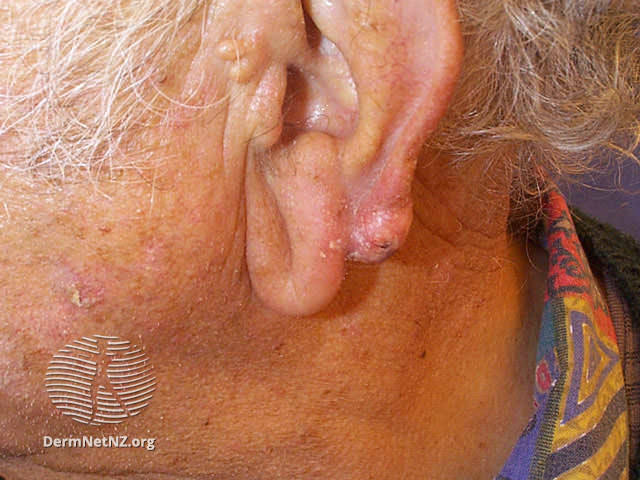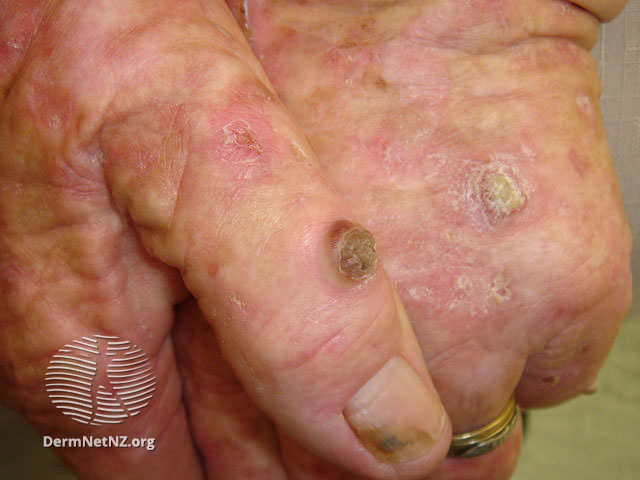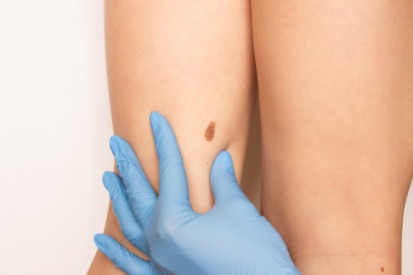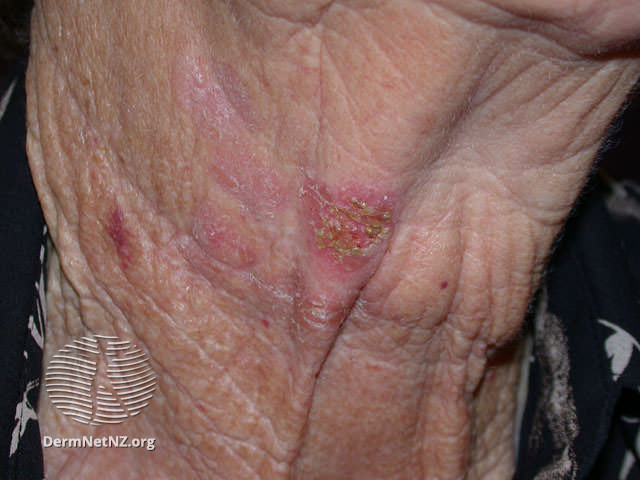Squamous Cell Carcinoma
Squamous cell carcinoma, the second most prevalent skin cancer, is a diagnosis for over 200,000 Americans each year. Arising from cells in the epidermis, the outermost layer of the skin, it typically emerges in sun-exposed areas but has the potential to develop anywhere on the body. Zitelli & Brodland, renowned experts in skin cancer treatment, assume a pivotal role in addressing squamous cell carcinoma, ensuring comprehensive and specialized care.
While these carcinomas generally remain localized to the skin in their early stages, untreated cases may progress, penetrating underlying tissues. In a minority of instances, squamous cell carcinomas may metastasize, posing a potentially fatal threat as they spread to local lymph nodes, distant tissues, or organs. The risk of metastasis is often associated with larger tumor size and the presence of ulceration. These metastatic occurrences are more likely to emerge on chronic wounds, mucous membranes, lips, or ears.
The specialized care offered by Zitelli & Brodland proves instrumental in improving outcomes for individuals affected by squamous cell carcinoma. Their expertise not only focuses on addressing the immediate concerns but also on preventing metastasis and enhancing the overall prognosis. The commitment to tailored and advanced treatment approaches ensures that patients receive comprehensive care, emphasizing both medical excellence and the compassionate support necessary for their skin health journey.
Examples of Squamous Cell Carcinoma




Warning
This content contains sensitive images.
Symptoms of Squamous Cell Carcinoma
- Squamous cell carcinoma usually begins as a dome-shaped bump or a red, scaly patch of skin.
- Rough and crusty and can bleed easily when scraped.
- Changes in existing growths: changes in the appearance of existing skin growths, such as warts or scars.
- Persistent sore: a sore or lump that doesn't heal, or a lesion that keeps recurring.
What Causes Squamous Cell Carcinoma?
- Squamous cell carcinoma (SCC) can affect individuals across diverse backgrounds.
- It is more prevalent in those with regular exposure to direct sunlight, especially in professions or lifestyles that involve significant sun exposure.
- While skin cancer is less common in individuals with darker complexions, they are at an increased risk for SCC in areas of the body not typically exposed to the sun.
Squamous Cell Carcinoma Prevention
Squamous Cell Carcinoma FAQs
While SCC predominantly occurs in sun-exposed areas like the face, ears, lips, and neck, it can develop on any part of the body.
Diagnosis involves a biopsy, where a sample is examined under a microscope. Dermatologists assess features such as size, location, and ulceration to ensure accurate diagnosis and treatment planning.
Treatment options vary based on factors like size, location, and stage. Common treatments include surgical excision, Mohs surgery, radiation therapy, and topical treatments. Individualized approaches may include immunotherapy or chemotherapy when necessary.
Yes, in a small percentage of cases, SCC can metastasize to local lymph nodes, distant tissues, or organs. Specialized care is particularly crucial in preventing metastasis, especially in cases where SCC is large, ulcerated, or located on specific areas with an increased risk.
Early detection is paramount for effective treatment and improved outcomes. Regular skin examinations, both self-checks and professional evaluations, are vital in identifying suspicious lesions or changes. The commitment to early detection ensures timely intervention and optimal care for individuals affected by SCC.
From Our QualDerm Family of Providers: Non-Melanoma Skin Cancers
Treatment Options for Squamous Cell Carcinoma
- Mohs micrographic surgery
- Excisional surgery
- Cryotherapy (freezing)
- Currettage and Electrodessication
- Chemotherapy
- Radiation
Featured Products for Sun Protection

EltaMD UV Physical SPF 41
For oil-free sun protection with just a touch of color, EltaMD's lightly tinted UV Physical is a healthy choice. This chemical-free mineral sunscreen has antioxidants to neutralize free radicals. Water-resistant UV Physical withstands water, humidity and perspiration. 3 oz

EltaMD UV Pure SPF 47
For those who want chemical-free active ingredients, EltaMD UV Pure is the ideal daily sunscreen. Great for children and adults, the gentle formula glides on wet or dry skin and rubs in quickly. UV Pure is formulated with purely physical active ingredients which are photostable. 4 oz / 114 g
Featured Healthy Skin Blogs

- Skin Cancer
Discover the truth about UV radiation and sunscreen as we debunk common myths in this blog.
Read More
- Skin Cancer
- Skin Exams
This comprehensive guide will walk you through what to expect during a Total Body Skin Exam (TBSE).
Read More
- Skin Cancer
Don’t become another cancer statistic. Skin cancer is easily preventable and if detected early, is highly treatable.
Read More

